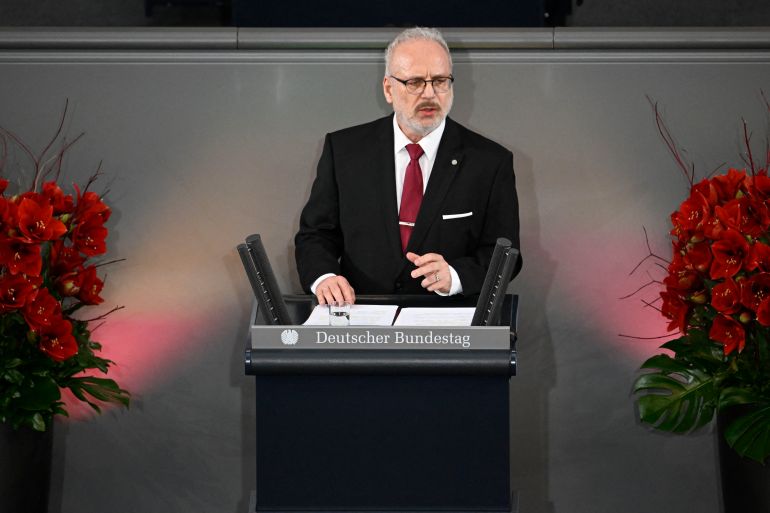Latvia urges Western allies to step up military aid for Ukraine
Latvian President Egils Levits tells Al Jazeera that Ukraine needs more support to resist a potential new Russian offensive.

Latvian President Egils Levits has urged Western countries to step up military support for Ukraine in order to prepare the war-torn country to respond to a potential new Russian offensive from next month.
“We should give all necessary support to Ukraine especially because Russia is preparing in February and March an offensive in Ukraine and Ukraine should have all necessary weapons and support to resist this offensive,” Levits told Al Jazeera on Monday on the sidelines of the World Economic Forum in Davos, Switzerland.
Keep reading
list of 3 itemsDrones have shaped the Ukraine war. Are ‘killer robots’ far off?
Belarus could join war if Ukraine ‘invades’, says Russia
“Therefore all tanks should be given to Ukraine when possible,” he said.
The call comes days before Western defence officials are due to take part in the Ukraine Defense Contact Group at the United States’ Ramstein Air Base in Germany.
At the meeting on Friday, which will be hosted by US Secretary of Defence Lloyd Austin, countries are expected to discuss Ukraine and related security issues facing NATO allies and partners, read a statement from the transatlantic military alliance.
This week, the United Kingdom became the first Western country to pledge to send heavy tanks to Ukraine. Poland and Finland have also signalled willingness to provide Kyiv with German-made tanks, but such a move would require the approval of Berlin.
On Sunday, NATO Secretary-General Jens Stoltenberg said he expected Western countries to boost heavy weapons deliveries to Ukraine, in what could signal a wider shift for European allies who have so far resisted directly supplying Ukraine with some types of heavy weapons since Russia’s invasion started in February.
The meeting of Ukraine’s allies will take place after Russian forces in recent days claimed an important battlefield success with the conquest of Soledar – a small salt-mining town close to the key city of Bakhmut in the eastern Donetsk region. Ukraine says its forces are still fighting in the town.
“There is a lot of potential for Western NATO countries to increase their support for Ukraine because it’s in the interest of the whole world, especially for all NATO and European countries to give the support in order to let Ukraine win the war,” said Levits.
“Only when Ukraine will have liberated the whole territory then there would be peace. And we are all interested in peace, a lasting peace,” he added.
Special tribunal
Latvia’s president also insisted on the need to establish a special tribunal that would try the Russian leadership for the crime of aggression.
His call comes amid a months-long effort by Kyiv and several other Western countries that want to see Russian leaders brought to justice over their invasion of Ukraine.
“This is the greatest violation of international law and of peace order … and for this crime of aggression there is no international court currently which could deal with this issue. Therefore this is a proposal – and Latvia is supporting this – to create a special tribunal of Russian aggression against Ukraine,” Levits said.
The International Criminal Court (ICC) cannot prosecute nationals of a non-party state with the crime of aggression, and Russia is not an ICC member. It could launch a prosecution if the United Nations Security Council (UNSC) referred the case to the ICC, but this is unlikely as Moscow holds veto power at the UNSC. The international court is investigating alleged war crimes and crimes against humanity committed in Ukraine, which would be hard to link directly to orders from the Kremlin.
The push for a special tribunal gained momentum in December when European Commission President Ursula von der Leyen backed the proposal. Soon after, France became the first European country to publicly declare its support, and on Monday German Foreign Minister Annalena Baerbock stressed the need to establish the court in order to fill “a loophole in international law”.
While there is growing pressure for the UK government to support the establishment of a tribunal, London has not thrown its weight behind the proposal and neither has the US.